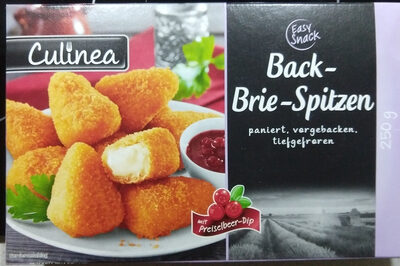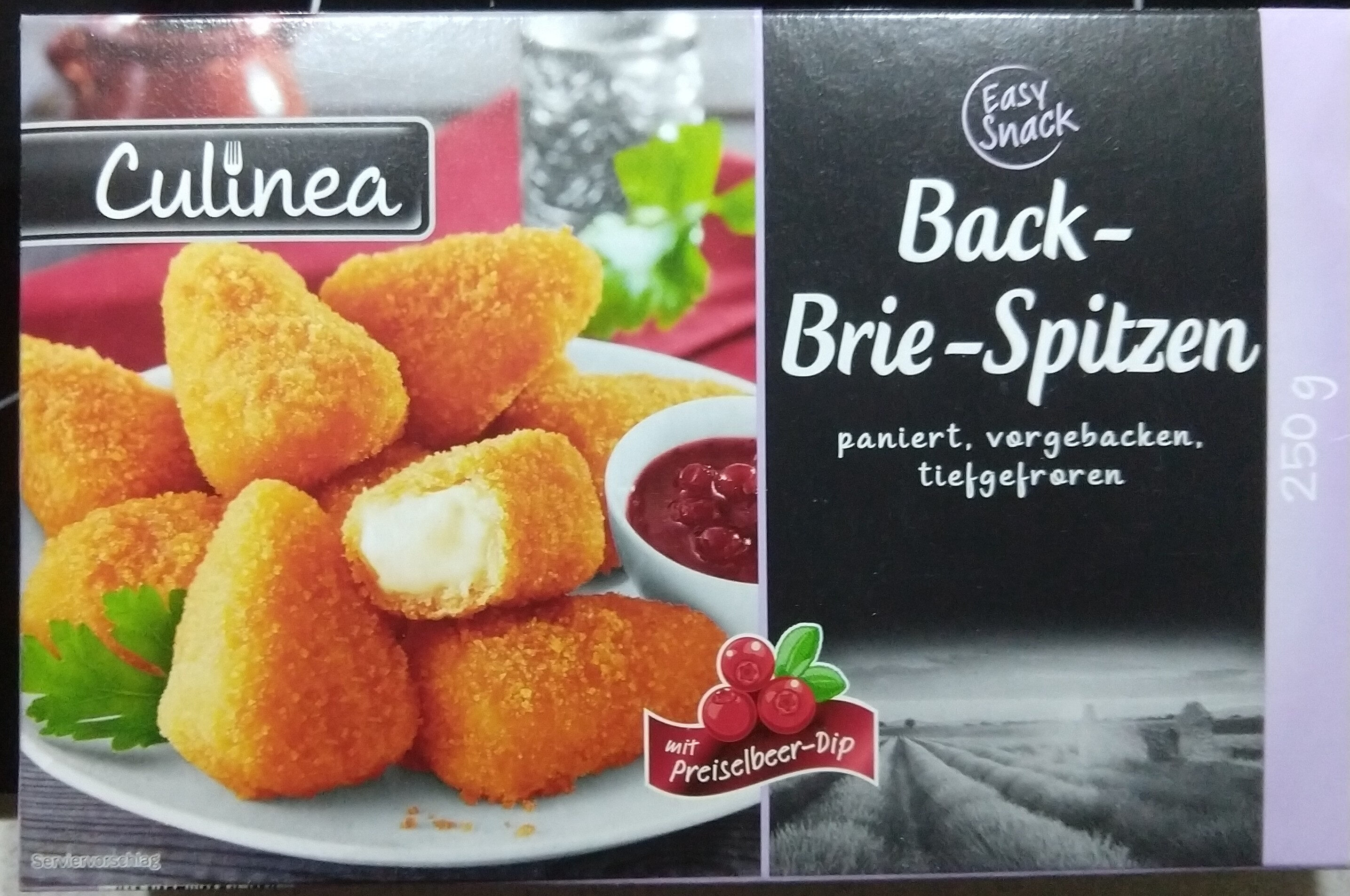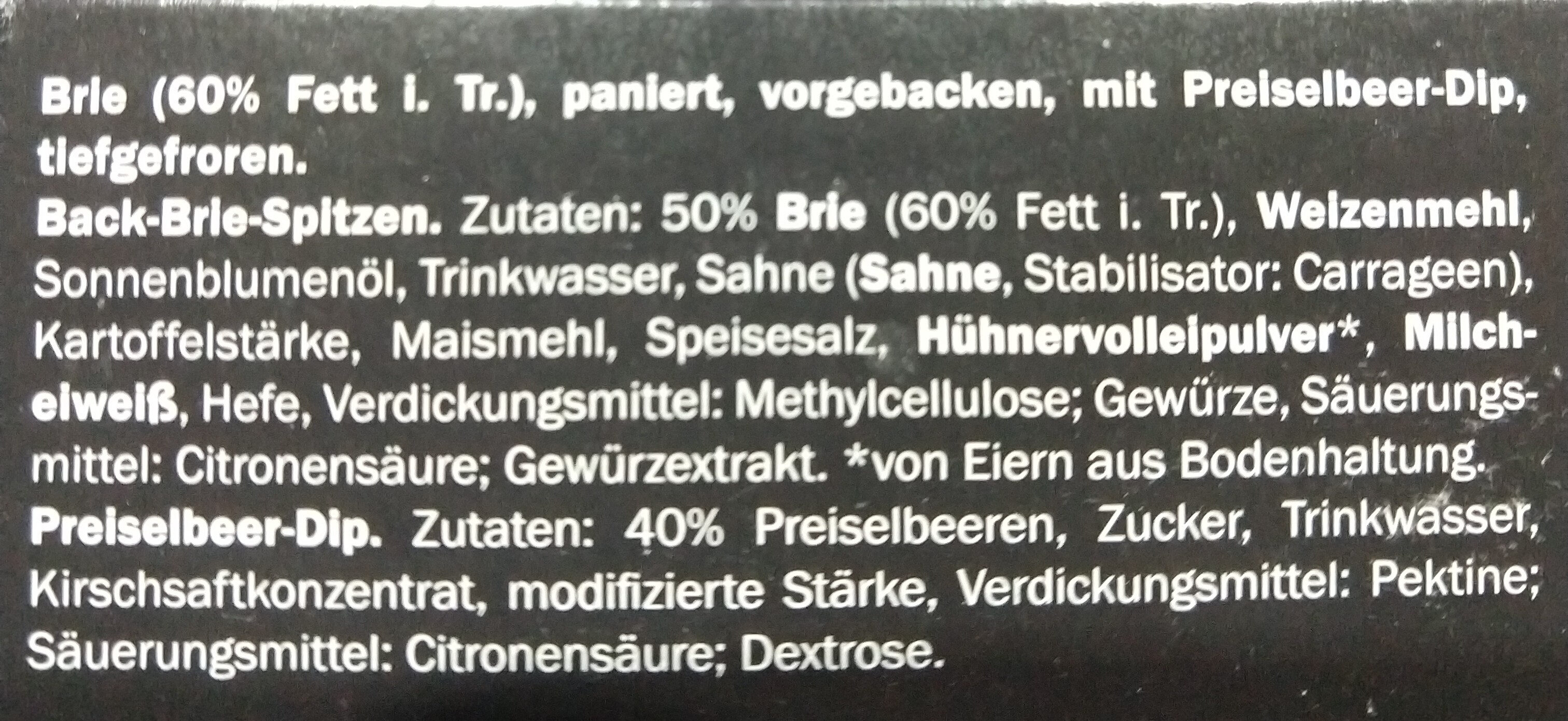Help us make food transparency the norm!
As a non-profit organization, we depend on your donations to continue informing consumers around the world about what they eat.
The food revolution starts with you!
Back Brie Spitzen - Culinea - 250 g
Back Brie Spitzen - Culinea - 250 g
Ambiguous barcode: This product has a Restricted Circulation Number barcode for products within a company. This means that different producers and stores can use the same barcode for different products.
×
This product page is not complete. You can help to complete it by editing it and adding more data from the photos we have, or by taking more photos using the app for Android or iPhone/iPad. Thank you!
×
Barcode: 20832032
Quantity: 250 g
Packaging: Cardboard, Paperboard
Categories: Dairies, Fermented foods, Fermented milk products, Cheeses, Frozen foods
Stores: Lidl
Countries where sold: Germany
Matching with your preferences
Health
Ingredients
-
24 ingredients
German: brie 50%, weizenmehl, sonnenblumenöl, trinkwasser, sahne (carrageen), kartoffelstärke, maismehl, speisesalz, hühnervolleipulver, milcheiweiß, hefe, methylcellulose, gewürze, citronensäure, gewürzextrakt. Preiselbeeren 40%, Zucker, Trinkwasser, Kirschsaftkonzentrat, modifizierte Stärke, Pektine, Citronensäure, Dextrose.Allergens: Eggs, Gluten, Milk
Food processing
-
Ultra processed foods
Elements that indicate the product is in the 4 - Ultra processed food and drink products group:
- Additive: E14XX - Modified Starch
- Additive: E407 - Carrageenan
- Additive: E440 - Pectins
- Additive: E461 - Methyl cellulose
- Ingredient: Dextrose
- Ingredient: Glucose
- Ingredient: Milk proteins
Food products are classified into 4 groups according to their degree of processing:
- Unprocessed or minimally processed foods
- Processed culinary ingredients
- Processed foods
- Ultra processed foods
The determination of the group is based on the category of the product and on the ingredients it contains.
Additives
-
E330 - Citric acid
Citric acid is a natural organic acid found in citrus fruits such as lemons, oranges, and limes.
It is widely used in the food industry as a flavor enhancer, acidulant, and preservative due to its tart and refreshing taste.
Citric acid is safe for consumption when used in moderation and is considered a generally recognized as safe (GRAS) food additive by regulatory agencies worldwide.
-
E407 - Carrageenan
Carrageenan (E407), derived from red seaweed, is widely employed in the food industry as a gelling, thickening, and stabilizing agent, notably in dairy and meat products.
It can exist in various forms, each imparting distinct textural properties to food.
However, its degraded form, often referred to as poligeenan, has raised health concerns due to its potential inflammatory effects and its classification as a possible human carcinogen (Group 2B) by the International Agency for Research on Cancer (IARC).
Nevertheless, food-grade carrageenan has been deemed safe by various regulatory bodies when consumed in amounts typically found in food.
-
E440 - Pectins
Pectins (E440) are natural carbohydrates, predominantly found in fruits, that act as gelling agents in the food industry, creating the desirable jelly-like texture in jams, jellies, and marmalades.
Pectins stabilize and thicken various food products, such as desserts, confectioneries, and beverages, ensuring a uniform consistency and quality.
Recognized as safe by various health authorities, pectins have been widely used without notable adverse effects when consumed in typical dietary amounts.
-
E461 - Methyl cellulose
Methyl cellulose: Methyl cellulose -or methylcellulose- is a chemical compound derived from cellulose. It is a hydrophilic white powder in pure form and dissolves in cold -but not in hot- water, forming a clear viscous solution or gel. It is sold under a variety of trade names and is used as a thickener and emulsifier in various food and cosmetic products, and also as a treatment of constipation. Like cellulose, it is not digestible, not toxic, and not an allergen.Source: Wikipedia
Ingredients analysis
-
Palm oil free
No ingredients containing palm oil detected
-
Non-vegan
Non-vegan ingredients: Brie, Cream, Whole powdered chicken egg, Milk proteins
-
Maybe vegetarian
Ingredients that may not be vegetarian: Brie
-
Details of the analysis of the ingredients
de: brie 50%, weizenmehl, sonnenblumenöl, trinkwasser, sahne (carrageen), kartoffelstärke, maismehl, speisesalz, hühnervolleipulver, milcheiweiß, hefe, methylcellulose, gewürze, citronensäure, gewürzextrakt, Preiselbeeren 40%, Zucker, Trinkwasser, Kirschsaft, modifizierte Stärke, Pektine, Citronensäure, Dextrose- brie -> en:brie - vegan: no - vegetarian: maybe - ciqual_food_code: 12020 - percent: 50
- weizenmehl -> en:wheat-flour - vegan: yes - vegetarian: yes - ciqual_proxy_food_code: 9410
- sonnenblumenöl -> en:sunflower-oil - vegan: yes - vegetarian: yes - from_palm_oil: no - ciqual_food_code: 17440
- trinkwasser -> en:water - vegan: yes - vegetarian: yes - ciqual_food_code: 18066
- sahne -> en:cream - vegan: no - vegetarian: yes - ciqual_food_code: 19402
- carrageen -> en:e407 - vegan: yes - vegetarian: yes
- kartoffelstärke -> en:potato-starch - vegan: yes - vegetarian: yes - ciqual_proxy_food_code: 9510
- maismehl -> en:corn-flour - vegan: yes - vegetarian: yes - ciqual_food_code: 9545
- speisesalz -> en:salt - vegan: yes - vegetarian: yes - ciqual_food_code: 11058
- hühnervolleipulver -> en:whole-powdered-chicken-egg - vegan: no - vegetarian: yes - ciqual_food_code: 22000
- milcheiweiß -> en:milk-proteins - vegan: no - vegetarian: yes
- hefe -> en:yeast - vegan: yes - vegetarian: yes - ciqual_proxy_food_code: 11009
- methylcellulose -> en:e461 - vegan: yes - vegetarian: yes
- gewürze -> en:spice - vegan: yes - vegetarian: yes
- citronensäure -> en:e330 - vegan: yes - vegetarian: yes
- gewürzextrakt -> en:spice-extract - vegan: yes - vegetarian: yes
- Preiselbeeren -> en:lingonberry - vegan: yes - vegetarian: yes - percent: 40
- Zucker -> en:sugar - vegan: yes - vegetarian: yes - ciqual_proxy_food_code: 31016
- Trinkwasser -> en:water - vegan: yes - vegetarian: yes - ciqual_food_code: 18066
- Kirschsaft -> en:cherry-juice - vegan: yes - vegetarian: yes - ciqual_food_code: 13008
- modifizierte Stärke -> en:modified-starch - vegan: yes - vegetarian: yes - ciqual_proxy_food_code: 9510
- Pektine -> en:e440a - vegan: yes - vegetarian: yes
- Citronensäure -> en:e330 - vegan: yes - vegetarian: yes
- Dextrose -> en:dextrose - vegan: yes - vegetarian: yes - ciqual_proxy_food_code: 31016
Nutrition
-
Poor nutritional quality
⚠ ️Warning: the amount of fiber is not specified, their possible positive contribution to the grade could not be taken into account.⚠ ️Warning: the amount of fruits, vegetables and nuts is not specified on the label, it was estimated from the list of ingredients: 40This product is not considered a beverage for the calculation of the Nutri-Score.
Positive points: 5
- Proteins: 5 / 5 (value: 10.6, rounded value: 10.6)
- Fiber: 0 / 5 (value: 0, rounded value: 0)
- Fruits, vegetables, nuts, and colza/walnut/olive oils: 0 / 5 (value: 40, rounded value: 40)
Negative points: 22
- Energy: 4 / 10 (value: 1515, rounded value: 1515)
- Sugars: 2 / 10 (value: 12.1, rounded value: 12.1)
- Saturated fat: 10 / 10 (value: 11.4, rounded value: 11.4)
- Sodium: 6 / 10 (value: 544, rounded value: 544)
The points for proteins are counted because the product is in the cheeses category.
Nutritional score: (22 - 5)
Nutri-Score:
-
Nutrient levels
-
Fat in high quantity (21.9%)
What you need to know- A high consumption of fat, especially saturated fats, can raise cholesterol, which increases the risk of heart diseases.
Recommendation: Limit the consumption of fat and saturated fat- Choose products with lower fat and saturated fat content.
-
Saturated fat in high quantity (11.4%)
What you need to know- A high consumption of fat, especially saturated fats, can raise cholesterol, which increases the risk of heart diseases.
Recommendation: Limit the consumption of fat and saturated fat- Choose products with lower fat and saturated fat content.
-
Sugars in moderate quantity (12.1%)
What you need to know- A high consumption of sugar can cause weight gain and tooth decay. It also augments the risk of type 2 diabetes and cardio-vascular diseases.
Recommendation: Limit the consumption of sugar and sugary drinks- Sugary drinks (such as sodas, fruit beverages, and fruit juices and nectars) should be limited as much as possible (no more than 1 glass a day).
- Choose products with lower sugar content and reduce the consumption of products with added sugars.
-
Salt in moderate quantity (1.36%)
What you need to know- A high consumption of salt (or sodium) can cause raised blood pressure, which can increase the risk of heart disease and stroke.
- Many people who have high blood pressure do not know it, as there are often no symptoms.
- Most people consume too much salt (on average 9 to 12 grams per day), around twice the recommended maximum level of intake.
Recommendation: Limit the consumption of salt and salted food- Reduce the quantity of salt used when cooking, and don't salt again at the table.
- Limit the consumption of salty snacks and choose products with lower salt content.
-
-
Nutrition facts
Nutrition facts As sold
for 100 g / 100 mlAs sold
per serving (250g)Compared to: Frozen foods Energy 1,515 kj
(362 kcal)3,790 kj
(905 kcal)+103% Fat 21.9 g 54.7 g +190% Saturated fat 11.4 g 28.5 g +218% Carbohydrates 29.5 g 73.8 g +48% Sugars 12.1 g 30.2 g +13% Fiber ? ? Proteins 10.6 g 26.5 g +92% Salt 1.36 g 3.4 g +198% Fruits‚ vegetables‚ nuts and rapeseed‚ walnut and olive oils (estimate from ingredients list analysis) 40 % 40 %
Environment
-
Eco-Score C - Moderate environmental impact
⚠ ️Select a country in order to include the full impact of transportation.The Eco-Score is an experimental score that summarizes the environmental impacts of food products.→ The Eco-Score was initially developped for France and it is being extended to other European countries. The Eco-Score formula is subject to change as it is regularly improved to make it more precise and better suited to each country.Life cycle analysis
-
Average impact of products of the same category: C (Score: 55/100)
Category: Camembert cheese, from cow's milk
Category: Camembert cheese, from cow's milk
- PEF environmental score: 0.48 (the lower the score, the lower the impact)
- including impact on climate change: 5.18 kg CO2 eq/kg of product
Stage Impact Agriculture
84.1 %Processing
5.7 %Packaging
4.5 %Transportation
3.4 %Distribution
1.8 %Consumption
0.5 %
Bonuses and maluses
-
Missing origins of ingredients information
Malus: -5
⚠ ️ The origins of the ingredients of this product are not indicated.
If they are indicated on the packaging, you can modify the product sheet and add them.
If you are the manufacturer of this product, you can send us the information with our free platform for producers.
-
Packaging with a low impact
Malus: -1
Shape Material Recycling Impact Unknown Paperboard Low ⚠ ️ The information about the packaging of this product is not sufficiently precise (exact shapes and materials of all components of the packaging).⚠ ️ For a more precise calculation of the Eco-Score, you can modify the product page and add them.
If you are the manufacturer of this product, you can send us the information with our free platform for producers.
Eco-Score for this product
-
Impact for this product: C (Score: 49/100)
Product: Back Brie Spitzen - Culinea - 250 g
Life cycle analysis score: 55
Sum of bonuses and maluses: -6
Final score: 49/100
-
Carbon footprint
-
Equal to driving 2.7 km in a petrol car
518 g CO² per 100g of product
The carbon emission figure comes from ADEME's Agribalyse database, for the category: Camembert cheese, from cow's milk (Source: ADEME Agribalyse Database)
Stage Impact Agriculture
85.0 %Processing
5.1 %Packaging
5.1 %Transportation
4.1 %Distribution
0.7 %Consumption
0.1 %
Packaging
-
Packaging with a low impact
-
Packaging parts
(Paperboard)
-
Packaging materials
Material % Packaging weight Packaging weight per 100 g of product Paper or cardboard
-
Transportation
-
Origins of ingredients
Missing origins of ingredients information
⚠ ️ The origins of the ingredients of this product are not indicated.
If they are indicated on the packaging, you can modify the product sheet and add them.
If you are the manufacturer of this product, you can send us the information with our free platform for producers.Add the origins of ingredients for this product Add the origins of ingredients for this product
Report a problem
-
Incomplete or incorrect information?
Category, labels, ingredients, allergens, nutritional information, photos etc.
If the information does not match the information on the packaging, please complete or correct it. Open Food Facts is a collaborative database, and every contribution is useful for all.
Data sources
Product added on by horatio
Last edit of product page on by roboto-app.
Product page also edited by openfoodfacts-contributors, packbot, sandman095.










